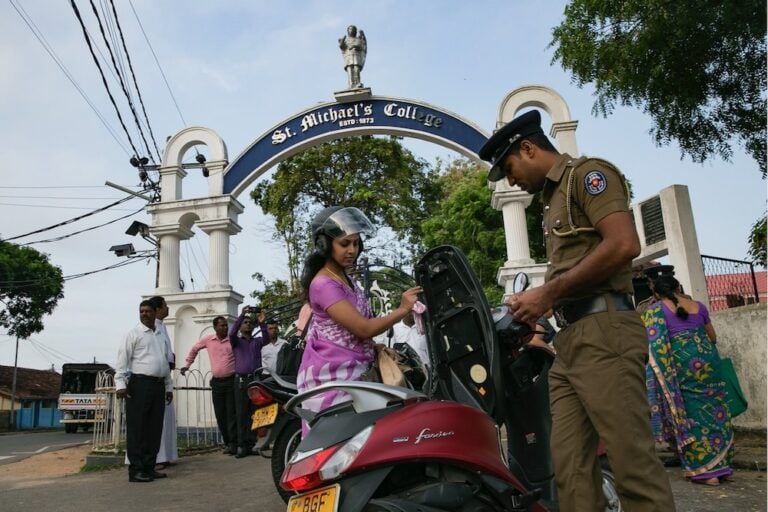**Updates IFEX alerts of 22 and 4 May 2000** (CPJ/IFEX) – In a 22 May 2000 letter to President Chandrika Bandaranaike Kumaratunga, CPJ expressed profound dismay over his government’s use of censorship regulations to restrict coverage of the war against the Liberation Tigers of Tamil Eelam (LTTE). The organisation is particularly alarmed by the recent […]
**Updates IFEX alerts of 22 and 4 May 2000**
(CPJ/IFEX) – In a 22 May 2000 letter to President Chandrika Bandaranaike Kumaratunga, CPJ expressed profound dismay over his government’s use of censorship regulations to restrict coverage of the war against the Liberation Tigers of Tamil Eelam (LTTE). The organisation is particularly alarmed by the recent decision of the chief censor, Ariya Rubasinghe, to shut down the Tamil-language daily “Uthayan” and the English-language weekly “The Sunday Leader”.
CPJ is further troubled by numerous reports indicating that the censors are exercising their authority in a partisan and arbitrary way–allowing, for example, stories and cartoons critical of the opposition while censoring identical pieces that focus instead on the presidentâs administration. The Sri Lankan people have the right to uncensored, independent news and information about the course of the war and the government’s handling of the crisis.
On the evening of 19 May, authorities closed the offices of “Uthayan”, the only Tamil daily published in the northern city of Jaffna. According to news reports, government troops forced all employees to leave the premises, and then locked the building. Rubasinghe justified the government’s decision by accusing the newspaper of “acting maliciously and detrimentally in publishing information that is biased to the LTTE,” but local journalists say that the editors of Uthayan had taken great pains to report fairly in a tense, often dangerous atmosphere.
Prior to the raid, “Uthayan”‘s assistant general manager and deputy editor, N. Vidyatharan, had repeatedly told authorities that because the civil war has disrupted telecommunication links between the Jaffna peninsula and the rest of Sri Lanka, “Uthayan” could not submit articles to censors in Colombo. Vidyatharan asked that a censor be appointed in Jaffna, as was done in 1998, according to “The Sunday Times”, an English-language daily published in Colombo.
On 22 May, at around 6 p.m. (local time), dozens of police shut down a printing facility operated by Leader Publications (Pvt.) Ltd., which owns the English-language daily “The Sunday Leader”, in order to stop the paper’s publication. Police locked the building and installed armed guards outside, according to the paper’s editor, Lasantha Wickrematunge. The raid was prompted by a 21 May article in “The Sunday Leader” titled “War in Fantasyland”, which lampooned the government’s censorship policy. The ban on the paper is to remain in effect for six months. However, the closure of the printing press has also interrupted the production of “Irida Peramuna”, the Sinhala-language counterpart of “The Sunday Leader”, along with five other publications owned by the Leader group, according to Wickrematunge.
Meanwhile, the private television station Telshan Network Limited (TNL), which is owned by the brother of opposition leader Ranil Wickremasinghe, has been threatened with closure, according to CPJ’s sources, for allegedly violating the terms of a censorship order prohibiting news coverage of a 17 May bomb attack in the eastern town of Batticaloa, in which at least twenty-three people were killed. The attack occurred during a major Buddhist festival, and the government defended the local news blackout by saying that media coverage could provoke reprisal attacks against the minority Tamil community.
According to the BBC, however, nearly all the victims were in fact ethnic Tamils. Joseph Pararajasingham, a member of parliament from Batticaloa, has sent an open letter to Her Excellency, claiming that minutes after the blast, government security forces opened fire on the crowd, injuring scores of civilians.
Around midnight on 17 May, at least eight police officers with the Criminal Investigation Bureau (CID) arrived at the home of TNL news editor Namal Perera and interrogated him. “We did not report the incident, but all we told our viewers was that we are unable to bring the news of a bomb attack because the censor had not cleared our report,” Perera later told Agence France-Presse. “We did not violate the censorship.”
Recommended Action
Send appeals to the president:
- stating that censorship has no place in any democratic country
- urging her to lift the censorship orders and to ensure that journalists are able to report freely in conflict zones
- calling for an end to these harsh and unjustifiable regulations
- asking that both “Uthayan” and “The Sunday Leader” be allowed to resume publishing immediately
Appeals To
Her Excellency Chandrika Bandaranaike Kumaratunga
President, Democratic Socialist Republic of Sri Lanka
Presidential Secretariat
Colombo-1
Sri Lanka
Fax: +011 94 1 333 703
Please copy appeals to the source if possible.


